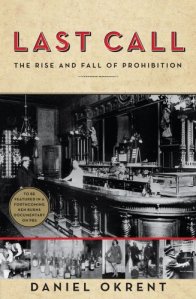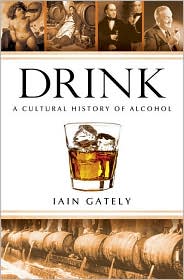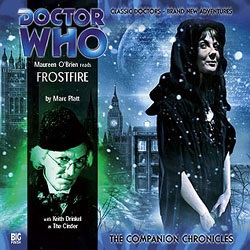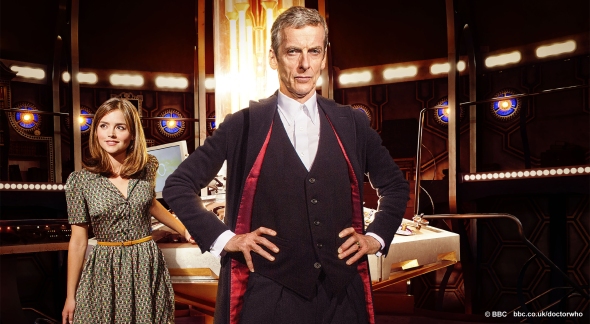Rapid review – Doctor Who: “Deep Breath”
Posted: 24 August 2014 Filed under: Doctor Who | Tags: deep breath, Doctor Who, review Leave a commentI considered just tweeting out my thoughts on the first episode of Doctor Who series 8, “Deep Breath”, but it became clear I needed more than 140 characters. Spoilery stuff below, so click on if you dare…
Rapid review: Last Call (Daniel Okrent)
Posted: 25 May 2012 Filed under: History | Tags: daniel okrent, last call, postaweek2012, prohibition, review Leave a commentDaniel Okrent, Last Call: The Rise and Fall of Prohibition (Scribner, 2010)
 Last fall, PBS aired Ken Burns’ latest documentary project on the subject of Prohibition. One of the advisors used for the film, and who appeared onscreen, was Daniel Okrent, who had his own book on Prohibition in the United States. Both projects’ developments ran in parallel; the inevitable cross-polination between the two led Okrent to call his and Burns’ works first cousins.
Last fall, PBS aired Ken Burns’ latest documentary project on the subject of Prohibition. One of the advisors used for the film, and who appeared onscreen, was Daniel Okrent, who had his own book on Prohibition in the United States. Both projects’ developments ran in parallel; the inevitable cross-polination between the two led Okrent to call his and Burns’ works first cousins.
Like Burns’ doc, Okrent begins Last Call in the late 19th century with the rise of the Women’s Christian Temperance Union and Anti-Saloon League. From the point of view of almost 100 years later, it just seems ludicrous that the movement toward Prohibition went as far as it did, toward its enshrinement in the Constitution of the United States. It wasn’t necessarily the enduring issue to begin with, but other events (such as the First World War) made Prohibition front and centre in the second half of the 1910s.
Okrent weaves many stories: from the crusaders who brought Prohibition from a religious movement to a political one; to those within government who weren’t really enamored of the whole thing and went out of their way to avoid enforcing the Volstead Act; and the bootleggers and criminal masterminds who built empires around the provision of illegal liquor to the masses. He then spends the last chapter winding down those stories, describing what happened to them when the 21st Amendment repealed the 18th, ending a 13-year experiment in alcohol proscription. Some have been forgotten into the mists of history, while others (Al Capone being an obvious example) live on in popular culture.
Clocking in at almost 400 pages, Last Call may be long, but it’s certainly not dull. It is a very intriguing look at the Prohibition era, and is a good complement to Ken Burns’ doc, but is just as enjoyable by itself, or perhaps your favourite drink.
Related: my review of Drink: A Cultural History of Alcohol
Rapid review: Long May You Run
Posted: 28 April 2011 Filed under: Running | Tags: postaweek2011, review Leave a comment
Chris Cooper, Long May You Run (Touchstone, 2010)
This book is a hodgepodge of running facts, figures, and motivations. Seemingly intended for an audience new to running, it has some items that can enlighten most veterans. In my case, I learned about the evolution of the marathon distance to its current 26.2 miles (you can thank the British royal family for that).
Chris Cooper has assembled an all-star crew that he calls “contributors” to the book, although it’s not clear which sections were contributed by such luminaries as Jeff Galloway, Scott Jurek, Kathrine Switzer, and Bart Yasso, among others. There are also profiles of other running legends of yore in the Hall of Fame series, including Emil Zátopek, Steve Prefontaine, and the late Grete Waitz.
As a Canadian reader of this book, I was a bit overwhelmed with the emphasis on many things American, including sections on running on the 4th of July and on Thanksgiving, and a blank page to write down 50 marathons completed in 50 states. In some race descriptions, mileage conversions of metric distances (“5k = 3.1 miles”) are relentless. There was even a little blurb about Bannister and Landy and the “Mile of the Century”, but was disappointed that Vancouver (where it took place in 1954) was not mentioned. I’m not sure why this bothers me, as I have a subscription to Runner’s World, but that’s the nature of the beast, I suppose.
Long May You Run is definitely an interesting compendium of running miscellanea for runners of all abilities. I would give it an OK recommendation simply because of its varied content and short snippets.
Yes, the Leafs suck, but do they have to be fixed?
Posted: 27 April 2010 Filed under: Canucks & Hockey, History | Tags: leafs suck, review Leave a commentDave Feschuk & Michael Grange, Leafs Abomination: The Dismayed Fan’s Handbook to Why the Leafs Stink and How They Can Rise Again (Random House, 2009) and Al Strachan, Why the Leafs Suck and How They Can Be Fixed (Collins, 2009)
Another NHL season has concluded with the Toronto Maple Leafs not in the playoffs, and the rest of Canada can only smile. Paradoxically, Canadians’ passion for hockey is matched in intensity by Canadians’ disdain and loathing of the Leafs. After reading not one, but two, histories of the Leafs since last winning the Stanley Cup in 1967, I think this is more an extension of general anti-Toronto sentiment than of the hockey operations of the Leafs.
 The two books obviously cover the same ground, but from different perspectives: Dave Feschuk and Michael Grange look at common scapegoats, as evidenced by such chapter titles as “Blame History” and “Blame the Fans”. Al Strachan takes a more linear approach, emphasizing individual incidents in the post-1967 history of the Leafs and expands on how each incident has contributed to the Leafs’ constant ineptitude. Indeed, a bulk of Strachan’s book summarizes each season from that Cup-winning 1966-67 campaign to 2008-09.
The two books obviously cover the same ground, but from different perspectives: Dave Feschuk and Michael Grange look at common scapegoats, as evidenced by such chapter titles as “Blame History” and “Blame the Fans”. Al Strachan takes a more linear approach, emphasizing individual incidents in the post-1967 history of the Leafs and expands on how each incident has contributed to the Leafs’ constant ineptitude. Indeed, a bulk of Strachan’s book summarizes each season from that Cup-winning 1966-67 campaign to 2008-09.
The reign of terror error of long-time Leafs owner Harold Ballard has, rightfully, been given significant emphasis in both books. Ballard’s exploits, some of which were legendary, seem nevertheless unbelievable in their scope and severity. The very-public battle for control following his death, and the team’s eventual partial ownership by the Ontario Teachers’ Pension Plan are also covered to varying degrees of detail.
The actual on-ice product, such as it was, that the Leafs tried to bring to fans had its own drama, and while some of it was connected to Ballard, a lot of it had to do with poor management. These books were obviously written before Brian Burke decided to trade 1st-round draft picks to Boston for Phil Kessel, but there were definitely precedents in that deal. One example that’s relevant for Canucks fans: in March 1996, Leafs fan favourite Wendel Clark (and Mathieu Schneider) was reacquired from the Islanders for Kenny Jönsson and a first-round draft pick. The Islanders used that pick to select Roberto Luongo.
 As for the parts of the books where the Leafs can be fixed, Strachan used a hypothetical situation involving starting from scratch and selecting draft picks that seemed too convoluted to follow properly. Feschuk and Grange use the Boston model, based on the successes of the Celtics and Red Sox in the 2000s as examples. Both books, of course, devote some time on Burke, but more in terms of his shortcomings in his previous GM positions, particularly in the playoffs (his 2007 Cup win with the Ducks notwithstanding).
As for the parts of the books where the Leafs can be fixed, Strachan used a hypothetical situation involving starting from scratch and selecting draft picks that seemed too convoluted to follow properly. Feschuk and Grange use the Boston model, based on the successes of the Celtics and Red Sox in the 2000s as examples. Both books, of course, devote some time on Burke, but more in terms of his shortcomings in his previous GM positions, particularly in the playoffs (his 2007 Cup win with the Ducks notwithstanding).
I do recommend both these books as entertaining primers on the laughable Leafs, and the fact that the authors didn’t have the rose-tinted glasses when assessing Burke’s status as saviour of the team. And so the drought continues…
This history of booze is refreshing and full-bodied
Posted: 14 June 2009 Filed under: History | Tags: booze, drink, iain gately, review 1 CommentIain Gately, Drink: A Cultural History of Alcohol (Gotham Books, 2008)
I may be eight years removed from graduating from UBC with a history degree, but that hasn’t stopped me from continuing to read up on my chosen field, even if my career path didn’t actually go in that direction.
Recently, I’ve started to read overarching socio-cultural histories of certain themes, such as travel and alcohol, which leads me to this one I’ve just finished by Iain Gately. Drink starts at the very beginning of human civilization and recounts how alcohol has been a part of human history ever since. From its initial discoveries,through antiquity and medieval times, all the way to exploration, industrialization, and globalization, booze, according to Gately, plays a central role throughout. Even the experiments with temperance and prohibition in the UK and USA in the 19th and 20th centuries couldn’t halt that progress.
 Intriguing as it is that alcoholic beverages have contributed to many historical events, it seems idealized or fantastical that booze alone contributed to such events. Gately portrays it that way, and it works in the context, providing some credibility to the pivotal role of alcohol. There is certainly an emphasis on modern, Western history, as more than two-thirds of this book covers the 18th century onward. There was one chapter devoted to Westernization of Asian drinking habits in the mid-20th century, but sadly, not much else.
Intriguing as it is that alcoholic beverages have contributed to many historical events, it seems idealized or fantastical that booze alone contributed to such events. Gately portrays it that way, and it works in the context, providing some credibility to the pivotal role of alcohol. There is certainly an emphasis on modern, Western history, as more than two-thirds of this book covers the 18th century onward. There was one chapter devoted to Westernization of Asian drinking habits in the mid-20th century, but sadly, not much else.
Gately also takes some time to look at the drinking habits of various practitioners of art over the centuries. Dutch painters, Romantic poets, French artists, and even rappers’ love of cognac and Cristal are all mentioned. And it’s not all good times, either. Gately devotes some pages in the later chapters to combat the darker side of alcohol consumption, which led to the formations of Alcoholics Anonymous and Mothers Against Drunk Driving, and the ongoing saga of the health benefits of alcohol consumption, its promotion by (mainly) winemakers, and the US government’s two-faced attempts to prevent such promotion despite the growing evidence.
Drink, while thick (at almost 500 pages), certainly makes for a great reading companion to that glass of wine or pint of beer. It also provides, for me at least, a new perspective to the established history and adds that cultural dimension that was lacking in the histories I was studying all those years ago.
Review – Doctor Who: Frostfire
Posted: 25 November 2008 Filed under: Doctor Who, Jane Austen City Limits | Tags: 1st doctor, frostfire, review Leave a commentDoctor Who: The Companion Chronicles 1.1 – Frostfire, written by Marc Platt, directed by Mark J Thompson (Big Finish, 2007)
Earlier this year, I posted about the actors who have appeared in the new Doctor Who and the recent Jane Austen adaptations. I later commented in AustenBlog, confirming to the Editrix that the Doctor has met Austen before. In both cases, I pointed to the recent release from Big Finish, Frostfire.
 Unlike Big Finish’s ongoing line of original audio plays featuring Doctors 5-8, the Companion Chronicles are essentially original stories of the first four Doctors, as re-told by one of the companions experiencing that story. In Frostfire, this companion is Vicki, who left the 1st Doctor in ancient Troy, changed her name to Cressida, and has moved on with her husband Troilus to Carthage in 1164 BCE. And she is recounting this tale to a mysterious Cinder.
Unlike Big Finish’s ongoing line of original audio plays featuring Doctors 5-8, the Companion Chronicles are essentially original stories of the first four Doctors, as re-told by one of the companions experiencing that story. In Frostfire, this companion is Vicki, who left the 1st Doctor in ancient Troy, changed her name to Cressida, and has moved on with her husband Troilus to Carthage in 1164 BCE. And she is recounting this tale to a mysterious Cinder.
The Doctor, Vicki and Steven land in London in February 1814. Encountering a frost fair, they come across a strange egg, the sight of which gets Vicki fainting. Helped by Miss Jane Austen, the Doctor and his friends discover the egg’s true purpose and manage to contain the creature within… or do they? The last five minutes, when the Cinder’s identity and future are revealed, do make sense when you re-read, as I did, the back of the CD case. It’s obviously only something that can be achieved with time travel, so that is a nice touch by Marc Platt.
Maureen O’Brien returns here as Vicki/Cressida, and she does breathe new life into a character she last played more than 40 years ago. She doesn’t attempt to re-create Vicki as she portrayed her then, but as a Vicki remembering this adventure from long ago (or is it the far future?). She even has the Doctor’s mannerisms down, with the “my boy”s and “hmm”s inserted at opportune moments. It is here that she describes her feelings for Steven: “dishy” as he is, she has always thought of him as a big brother whom she can tease and who can take the blame from the Doctor if need be.
Those feelings were prodded from Vicki by Miss Jane Austen. In terms of her literary career, it is correct that only two novels have been published (Sense and Sensibility and Pride and Prejudice, both anonymously) when the Doctor meets her here, despite his awkward fan-gushing moment. (Marc Platt must have been influenced by that scene in “The Unquiet Dead” when the 9th Doctor discovers he’s in the same carriage as Charles Dickens.) Miss Austen, like Dickens, Shakespeare, and Christie in the new series, takes to the Doctor and his companions quite quickly, and the scene where she punches out a fire-eater has to be heard to be believed. And the description of her: “velvet paws and steel claws”! Forget ladylike – I’ll take this kick-ass, take-charge version of Miss Austen any day! Janeites would definitely cringe at the characterization, but I might believe this version better than that in Becoming Jane.
I quite enjoyed listening to Frostfire, and it will certainly be in line to be re-listened in the near future. It would be a good introduction for anyone interested in the 1st Doctor, or anyone who has seen the new series and how the Doctor has interacted with literary greats. This one could certainly be used as a new-series story, had Marc Platt been given the chance to develop it.
Review – Doctor Who: Ghosts of India
Posted: 3 October 2008 Filed under: Doctor Who | Tags: 10th doctor, donna noble, ghosts of india, review Leave a commentMark Morris, Doctor Who: Ghosts of India (BBC Books, 2008)
I have just re-watched “Planet of the Ood” on the CBC, and have begun to pick up on the things that seemed meaningless on first viewing, but make more sense (and even become very, very relevant) in context of the season finale. I only mention that here because this novel is best placed between “Planet of the Ood” and “Sontaran Strategem”.
This is the first original Doctor Who novel I’ve read since the BBC ended the series of novels featuring the first eight Doctors, and focused on those featuring the 9th, then 10th Doctor. I particularly adore any Doctor Who historical story (pseudo- or otherwise), which was the primary reason I picked up this book on the day it was released in the UK.
 Donna Noble has a curry craving, and the Doctor indulges her by taking her to colonial India. Of course, he gets the timing off slightly, and manages to land in Calcutta in 1947, in the middle of the upheavals that will eventually lead to India’s independence from the UK. But in addition to the Indians rebelling against their British overlords, there are the “half-made men” roaming about, shadows where their eyes would have been.
Donna Noble has a curry craving, and the Doctor indulges her by taking her to colonial India. Of course, he gets the timing off slightly, and manages to land in Calcutta in 1947, in the middle of the upheavals that will eventually lead to India’s independence from the UK. But in addition to the Indians rebelling against their British overlords, there are the “half-made men” roaming about, shadows where their eyes would have been.
Just like in the TV stories set in the past, the Doctor encounters a significant historical figure, in this case, Mohandas “Mahatma” Gandhi. And just like in those TV stories, the Doctor just gushes when he meets Gandhi for the first time. But in that same sequence, there is a moment of gravitas when the Doctor and Gandhi wax philosophical about how similar, and yet how vastly different, their belief systems are. The genuine camaraderie between Gandhi and the Doctor, and later, Donna, is handled well, although I think Gandhi seems to accept the otherworldly events happening around him a bit too casually.
As for those otherworldly events, the main antagonism in Ghosts of India is not what it seems, and I’ll admit that I wasn’t expecting a role reversal when the real threat is exposed. The way this threat is neutralized is handled well, as is the Doctor handing some responsibility to Donna to help out a lot of Calcuttans caught in the alien machinations.
Mark Morris seems to have his characterizations down, from the Doctor’s usual manic self (although I couldn’t get used to having the sonic screwdriver reduced to the single, first word) to Donna’s in-your-face attitude, especially when being handled by colonial administrators and military types. The minor characters (particularly the Campbell family) were also given enough background and description for you to be invested in them for the story, but could easily forget them afterwards. However, I was expecting just a bit more between Adelaide and Edward beyond their strict professional relationship.
Ghosts of India is definitely worth a read, if you can find it on this side of the Atlantic. I don’t think I could have picked a better novel to restart my forays into original Doctor Who fiction. I should start going back into the back catalogue. Anyone with good suggestions?



!["The world is a beautiful place yet eveyone [sic] is unhappy" "The world is a beautiful place yet eveyone [sic] is unhappy"](https://live.staticflickr.com/7603/26516802003_0506f5361b_s.jpg)